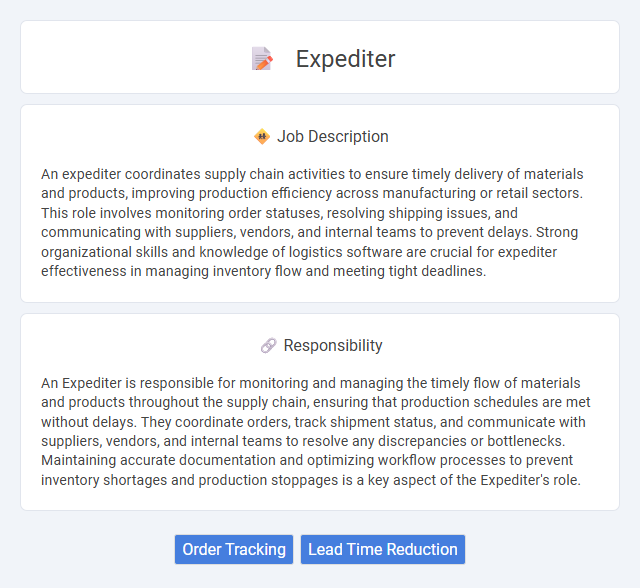
An expediter coordinates supply chain activities to ensure timely delivery of materials and products, improving production efficiency across manufacturing or retail sectors. This role involves monitoring order statuses, resolving shipping issues, and communicating with suppliers, vendors, and internal teams to prevent delays. Strong organizational skills and knowledge of logistics software are crucial for expediter effectiveness in managing inventory flow and meeting tight deadlines.
Individuals who demonstrate strong organizational skills and the ability to work efficiently under pressure are likely suitable for an expediter role. Those comfortable with multitasking and coordinating between departments may find this job aligns well with their capabilities. People who prefer a structured yet dynamic environment might experience higher job satisfaction and success in this position.
Qualification
An expediter typically requires strong organizational skills, attention to detail, and the ability to manage multiple tasks efficiently. Qualifications often include experience in supply chain management, logistics, or production environments, along with proficiency in inventory control software and communication tools. A background in project coordination or procurement, combined with problem-solving abilities, enhances performance in this role.
Responsibility
An Expediter is responsible for monitoring and managing the timely flow of materials and products throughout the supply chain, ensuring that production schedules are met without delays. They coordinate orders, track shipment status, and communicate with suppliers, vendors, and internal teams to resolve any discrepancies or bottlenecks. Maintaining accurate documentation and optimizing workflow processes to prevent inventory shortages and production stoppages is a key aspect of the Expediter's role.
Benefit
An expediter job likely offers the benefit of improving supply chain efficiency and reducing production delays by ensuring timely delivery of materials. Employees may experience enhanced organizational skills and increased communication abilities due to constant coordination with suppliers and production teams. There is also a probability of gaining valuable industry insight, which could lead to career advancement in logistics and operations management.
Challenge
The role of an Expediter likely involves managing complex supply chain logistics, which can present significant challenges in coordinating timely deliveries and resolving unexpected delays. Navigating communication between suppliers, manufacturers, and clients probably requires strong problem-solving skills and adaptability to rapidly changing situations. High-pressure decision-making and multitasking are expected to be frequent difficulties, demanding resilience and attention to detail.
Career Advancement
An expediter plays a crucial role in streamlining supply chain operations, ensuring timely delivery and efficient workflow management. Career advancement opportunities often include progression to logistics manager, supply chain analyst, or operations coordinator roles, where strategic planning and leadership skills are essential. Obtaining certifications such as APICS CPIM or Six Sigma can significantly enhance an expediter's qualifications and open doors to higher-level positions.
Key Terms
Order Tracking
Expediters specialize in order tracking to ensure timely delivery and efficient supply chain management. They monitor shipment statuses, update order progress, and coordinate with suppliers and carriers to resolve any delays or discrepancies. Accurate order tracking by expediters minimizes downtime, supports inventory control, and enhances customer satisfaction.
Lead Time Reduction
Expediter roles focus on streamlining supply chain processes to significantly reduce lead times by closely monitoring order statuses, coordinating with suppliers, and expediting shipments. Effective communication and proactive problem-solving ensure materials arrive just-in-time, minimizing delays and production downtime. Utilizing data-driven analytics enhances visibility into bottlenecks, enabling faster decision-making and improved inventory turnover rates.
 kuljobs.com
kuljobs.com